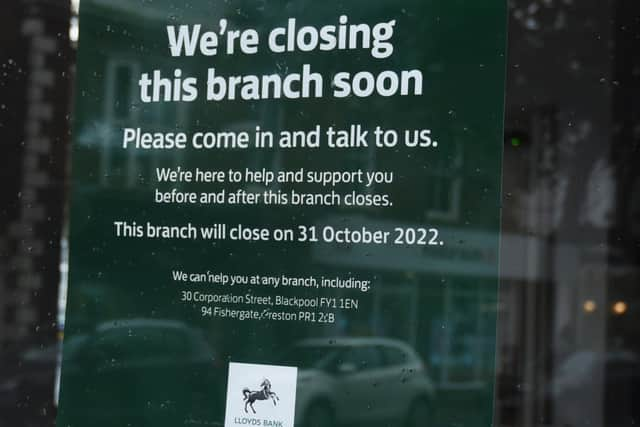Where have all the high street banks gone, don’t they owe the country gratitude for bailing them out? - Andrew Vine
I spotted the payment by chance the day after it was made and alerted the bank, which was very good, it froze my account and refunded the money. But as part of the security checks for a new debit card, it asked me to go into a branch and show some identification, which is fair enough.
Well, good luck with that. It used to have about half a dozen branches in Leeds, one less than a mile from my home which I used on a weekly basis and where the staff knew all their customers, but now there is only one left, in the city centre.
Advertisement
Hide AdAdvertisement
Hide AdThe weekday queue, almost to the door for the two cashiers behind the counter, put lie to the oft-repeated insistence of all the major banks that there is no longer much demand for in-person transactions.


So does the fact that when it comes to matters of account security, the good old-fashioned method of doing business face-to-face with an intelligent and helpful staff member like the one who checked my driving licence and sorted me out within a few minutes simply cannot be beaten.
But that doesn’t cut any ice with my bank or any of the others which have slashed the network of branches, inconveniencing customers, especially their older ones, and playing a damaging part in draining the life out of shopping streets.
There is seemingly no end to their determination to get rid of in-person banking, as shown by last week’s announcement by Lloyds and Halifax that a further 40 branches will be closing by April, with Halifax and Pontefract amongst the towns affected.
Advertisement
Hide AdAdvertisement
Hide AdIn Yorkshire, communities large and small are suffering the loss of a basic and essential service.
As the latest round of closures were announced, the consumer champion Which? revealed that the residents of Wentworth and Dearne, in South Yorkshire, have the unenviable distinction of living in the first Parliamentary constituency in the country to lose every single one of its banks.
And they’re about to be joined by the people of Sheffield Hallam, which will also have none left.
Yorkshire has lost nearly half its banks since 2015, amongst the 5,000 shut nationwide, an average of 54 every month, each of them shut with the same mealy-mouthed justification that demand for counter services has fallen as customers move their banking online.
Advertisement
Hide AdAdvertisement
Hide AdThere has undoubtedly been a move towards online banking, just as so much retailing has travelled the same route, but at least some of the growth is a consequence of customers being forced to go online by the closure of their local branches.
What are the people of Wentworth and Dearne, or Sheffield Hallam, to do now all their banks are gone? Travel for miles to find a branch? Of course not. Those who can will go online, because it is their only realistic option.
But what about those who cannot go online, or simply don’t want to because they feel more comfortable doing their banking in person?
The director of Age UK, Caroline Abrahams, says elderly people are being “cut adrift”, which is a disgraceful way for banks to treat some of their most loyal and long-standing customers.
Advertisement
Hide AdAdvertisement
Hide AdBusinesses are being cut adrift too. In response to the latest closures, Rother Valley MP Alexander Stafford condemned banks for “cutting this essential lifeline off from our streets”.
He’s spot-on. Banking is essential for retailers – especially independent shops – who need to deposit their takings in an age when increasing numbers of customers on tight budgets are paying cash in order to manage their weekly outgoings.
Mr Stafford was also correct when he said that banks have a duty of care to the communities they serve.
That means maintaining a presence on high streets, too many of which have already been ravaged by shop closures. Making life even more difficult for the traders who remain is an act of gross social irresponsibility by banks whose behaviour indicates that serving communities is very low on their list of priorities.
Advertisement
Hide AdAdvertisement
Hide AdIt is time for the Government to start putting pressure on banks to stop the endless rounds of branch closures. Ministers should not be shy of reminding the sector that hundreds of billions of public money was pumped into banks to prevent them going bust during the 2008 financial crisis.